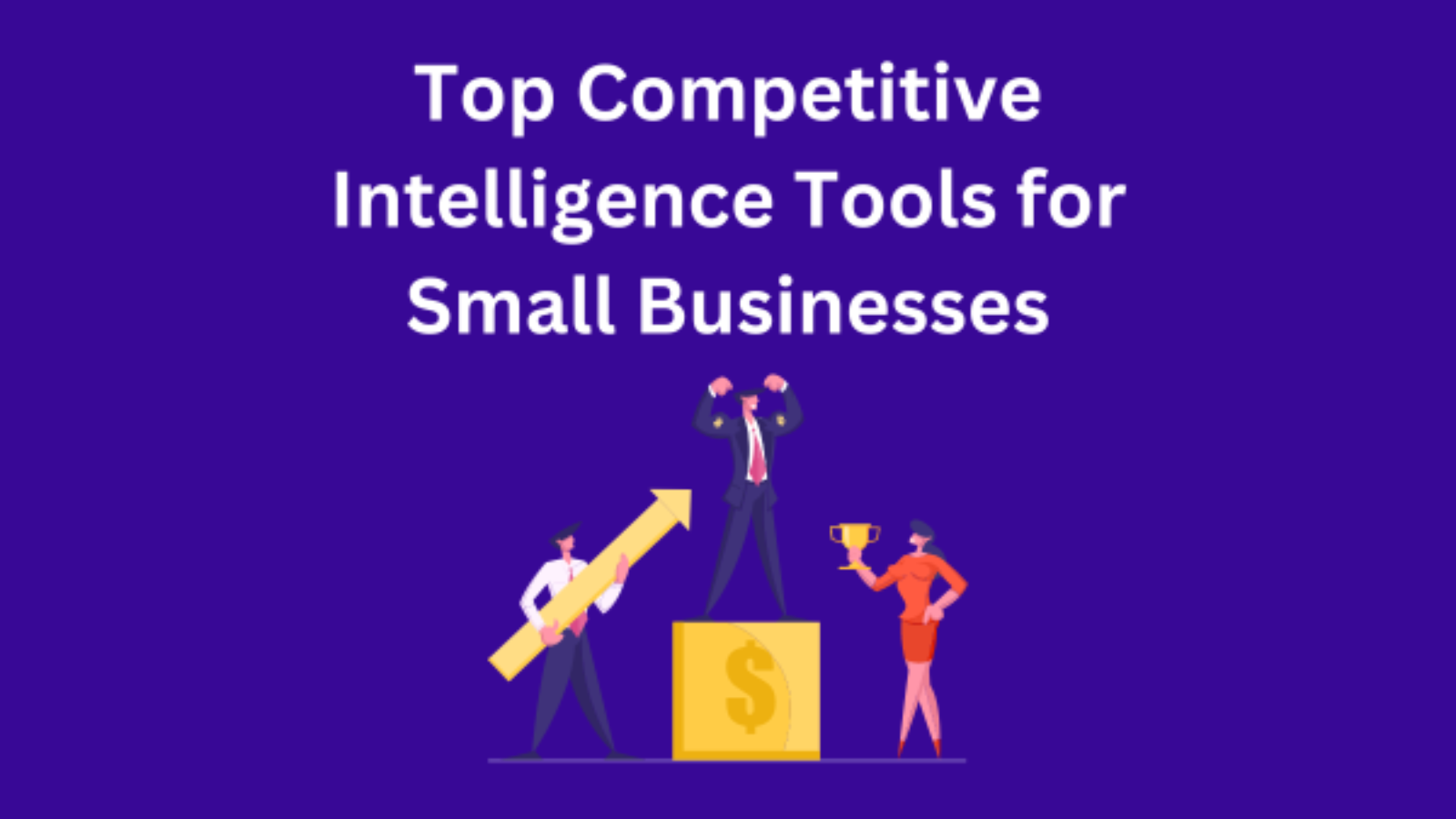Introduction
In today’s fast-paced business landscape, staying ahead of the competition isn’t just a strategy—it’s a necessity. For small businesses, understanding the competition, anticipating market shifts, and making informed decisions can be the difference between thriving and merely surviving. Competitive Intelligence (CI) serves as a valuable tool in this regard, helping businesses gather and analyze relevant data about their competitors and the market as a whole.
For small businesses, the challenge lies in accessing robust yet affordable competitive intelligence tools that deliver actionable insights. In this blog post, we’ll explore the top competitive intelligence tools available for small businesses, outlining their features, benefits, and how they can help companies stay competitive. From tracking competitors’ online presence to analyzing market trends, these tools empower businesses to make smarter decisions and maintain their edge in the market.
What is Competitive Intelligence?

Competitive Intelligence (CI) refers to the process of gathering, analyzing, and utilizing information about competitors, the market, and the business environment. It involves monitoring and understanding competitors’ activities—such as marketing efforts, product launches, pricing strategies, and customer engagement—along with overall market trends to anticipate shifts and develop better strategies.
For small businesses, CI is particularly important because it helps:
- Identify market opportunities and threats.
- Understand customer behavior and preferences.
- Improve product and service offerings.
- Optimize marketing and sales strategies.
- Foster innovation and stay ahead of the competition.
By leveraging CI, small businesses can make more informed decisions and stay agile in an ever-changing marketplace.
Criteria for Choosing the Right Competitive Intelligence Tool
When selecting a competitive intelligence tool, small businesses need to consider several factors to ensure the solution is both effective and sustainable. Below are some essential factors to consider:
1. Affordability:
For small businesses operating on tight budgets, cost is a major concern. The tool should offer a pricing model that is both affordable and scalable, allowing the business to upgrade as it grows.
2. Ease of Use:
A CI tool must be user-friendly, requiring minimal setup and training. Complex software can overwhelm small teams, so intuitive dashboards and easy integration with existing systems are key.
3. Scalability:
The tool should be able to grow alongside the business. As your company expands, so will your intelligence needs. A scalable CI tool allows you to add features or functionality as your requirements evolve.
4. Key Features:
A good competitive intelligence tool should offer features such as:
- Competitor tracking: Monitor competitor activities across various platforms.
- Data analysis: Process and analyze large volumes of data efficiently.
- Market trend analysis: Identify emerging trends and shifts in the industry.
- Alerts and reports: Receive updates on competitor moves in real-time.
With these criteria in mind, let’s dive into some of the top competitive intelligence tools available for small businesses today.
Top Competitive Intelligence Tools for Small Businesses

1. SEMrush
Overview
SEMrush is one of the most popular marketing tools available today, known for its extensive keyword research, SEO, and competitive analysis capabilities. Its competitive intelligence features allow businesses to track their competitors’ online strategies, analyze their advertising efforts, and identify potential market opportunities.
Key Features
- Competitor Analysis: Provides insights into competitors’ SEO performance, backlink profiles, and keyword strategies.
- Traffic Analytics: Analyze the traffic of any competitor’s website to uncover audience demographics, behavior, and geographic data.
- Market Research: Identifies emerging trends and shifts in market demand through comprehensive keyword and content analysis.
Benefits for Small Businesses
For small businesses, SEMrush’s wealth of data allows them to track the online performance of competitors and gain actionable insights. For example, a small e-commerce business can track how a competitor is ranking for certain keywords and adjust its SEO strategy accordingly.
Case Study
A small digital marketing agency, using SEMrush, managed to identify a major competitor’s underperforming content in specific keyword areas. By optimizing their own content and targeting those keywords, they increased their organic traffic by 30% within three months.
2. SpyFu
Overview
SpyFu is a specialized CI tool that focuses on competitor research, specifically in areas such as keyword tracking, pay-per-click (PPC) analysis, and SEO comparisons. It allows businesses to spy on competitors’ advertising efforts and find gaps in their own strategies.
Key Features
- Competitor Keyword Tracking: See which keywords your competitors are targeting and ranking for.
- PPC Analysis: Gain insights into your competitors’ paid advertising campaigns, including ad copy and spend.
- SEO Comparisons: Compare your website’s SEO performance against competitors and identify areas for improvement.
Benefits for Small Businesses
SpyFu is particularly useful for small businesses looking to gain an edge in PPC advertising. It allows businesses to study competitors’ ad campaigns, understand their bidding strategies, and create more effective PPC campaigns.
Case Study
A small online retailer used SpyFu to uncover a competitor’s highest-performing keywords in their PPC campaigns. By reallocating their ad spend to target those same keywords, they achieved a 20% increase in conversions within two months.
3. Crayon
Overview
Crayon is a competitive intelligence platform that offers comprehensive tracking of competitors’ activities. It aggregates data from multiple sources, including social media, press releases, and website updates, to give businesses a 360-degree view of their competitors.
Key Features
- Comprehensive Competitor Data Collection: Aggregates data from multiple sources to provide a full picture of competitors’ strategies.
- Sales and Marketing Strategy Analysis: Analyzes competitors’ marketing efforts, such as messaging, positioning, and content strategies.
- Benchmarking: Provides benchmarks for businesses to compare their performance against industry standards.
Benefits for Small Businesses
Crayon helps small businesses stay ahead by tracking not only what competitors are doing but also how they are positioning themselves in the market. This enables businesses to identify new opportunities and respond quickly to market changes.
Case Study
A small B2B SaaS company used Crayon to monitor competitors’ messaging and sales enablement strategies. By aligning their own sales materials with insights gathered from Crayon, they saw a 15% increase in sales conversions over six months.
4. Owler
Overview
Owler is a competitive intelligence tool that provides real-time updates on competitors’ activities, including financial performance, news mentions, and acquisitions. It’s particularly well-suited for small businesses that want to stay on top of industry developments and competitor moves.
Key Features
- Competitor News Tracking: Get updates on competitors’ activities, including press releases, product launches, and management changes.
- Financial Insights: Track competitors’ financial performance, including revenue growth and funding rounds.
- Customizable Reports: Create custom reports that provide insights into competitors’ strategies and market positioning.
Benefits for Small Businesses
Owler’s real-time updates allow small businesses to quickly respond to competitors’ moves. This can be particularly useful for businesses operating in fast-moving industries where staying up-to-date is critical.
Case Study
A small tech startup used Owler to monitor a competitor’s recent funding round and subsequent product launch. Armed with this information, the startup was able to adjust its own marketing campaign to highlight key differentiators, leading to increased customer engagement and a 10% rise in lead generation.
5. Klue
Overview
Klue is a competitive intelligence solution that streamlines the collection and analysis of competitor insights through automation. It offers actionable insights in the form of battle cards, which can be used by sales teams to counter competitors during pitches.
Key Features
- Automated Competitor Research: Automatically gathers data from public sources, including news, social media, and websites.
- Battle Cards: Provides sales teams with detailed competitor profiles and actionable insights to help close deals.
- Market Positioning Analysis: Helps businesses analyze competitors’ market positioning and identify potential threats or opportunities.
Benefits for Small Businesses
Klue is particularly valuable for small businesses with active sales teams. The battle cards give sales reps the tools they need to effectively counter competitors during client meetings and pitches, giving them a better chance of closing deals.
Case Study
A small SaaS company saw a 20% increase in win rates after implementing Klue’s battle cards in their sales process. By equipping their sales team with detailed competitor insights, they were able to anticipate objections and present stronger value propositions.
6. SimilarWeb
Overview
SimilarWeb is a digital market intelligence platform that provides insights into website traffic, user behavior, and industry trends. It allows businesses to benchmark their online performance against competitors and identify growth opportunities in the digital space.
Key Features
- Website Traffic Analysis: Provides detailed insights into competitors’ website traffic, including sources, audience demographics, and engagement metrics.
- Industry Benchmarks: Compares your website’s performance against industry averages and competitors.
- Digital Trend Analysis: Identifies emerging trends in digital marketing and consumer behavior.
Benefits for Small Businesses
SimilarWeb is ideal for small businesses that rely on digital marketing. It helps them benchmark their online performance against competitors and identify areas for improvement, whether that’s in SEO, content marketing, or social media engagement.
Case Study
A small fashion retailer used SimilarWeb to track their competitors’ website traffic sources. By identifying that a competitor was gaining significant traffic from Instagram, the retailer shifted more of their marketing efforts to Instagram and saw a 25% increase in website traffic within two months.
How to Implement Competitive Intelligence Tools Effectively
Selecting the right tool is only the first step; implementing it effectively is equally important. Here are some best practices for small businesses looking to integrate CI tools into their operations:
1. Develop a Competitive Intelligence Strategy:
Before diving into any tool, it’s crucial to have a well-defined CI strategy. This includes setting goals, identifying key competitors,
and determining the specific data you need to collect.
2. Monitor Continuously:
CI is not a one-time effort. To stay ahead of the competition, businesses need to continuously monitor their competitors and the market. Set up alerts and regular reports to ensure you are always informed about relevant changes.
3. Share Insights Across Teams:
CI is valuable for various departments within a business, from marketing and sales to product development. Ensure that insights gathered from your CI tools are shared across teams so that everyone is aligned and can act on the information.
4. Act on the Data:
Competitive intelligence is only useful if you take action based on the insights. Use the data to refine your marketing strategies, adjust your product offerings, or improve customer engagement.
Conclusion
Competitive Intelligence is an indispensable tool for small businesses that want to remain competitive in their industry. By leveraging the right CI tools—such as SEMrush, SpyFu, Crayon, Owler, Klue, and SimilarWeb—small businesses can gain valuable insights into their competitors, market trends, and customer behavior. Armed with this knowledge, they can make more informed decisions, optimize their strategies, and drive growth.
In today’s dynamic business environment, proactive use of competitive intelligence can help small businesses not only survive but thrive. So take the time to evaluate the tools that best fit your needs and start implementing a competitive intelligence strategy that will give you an edge in the market.

